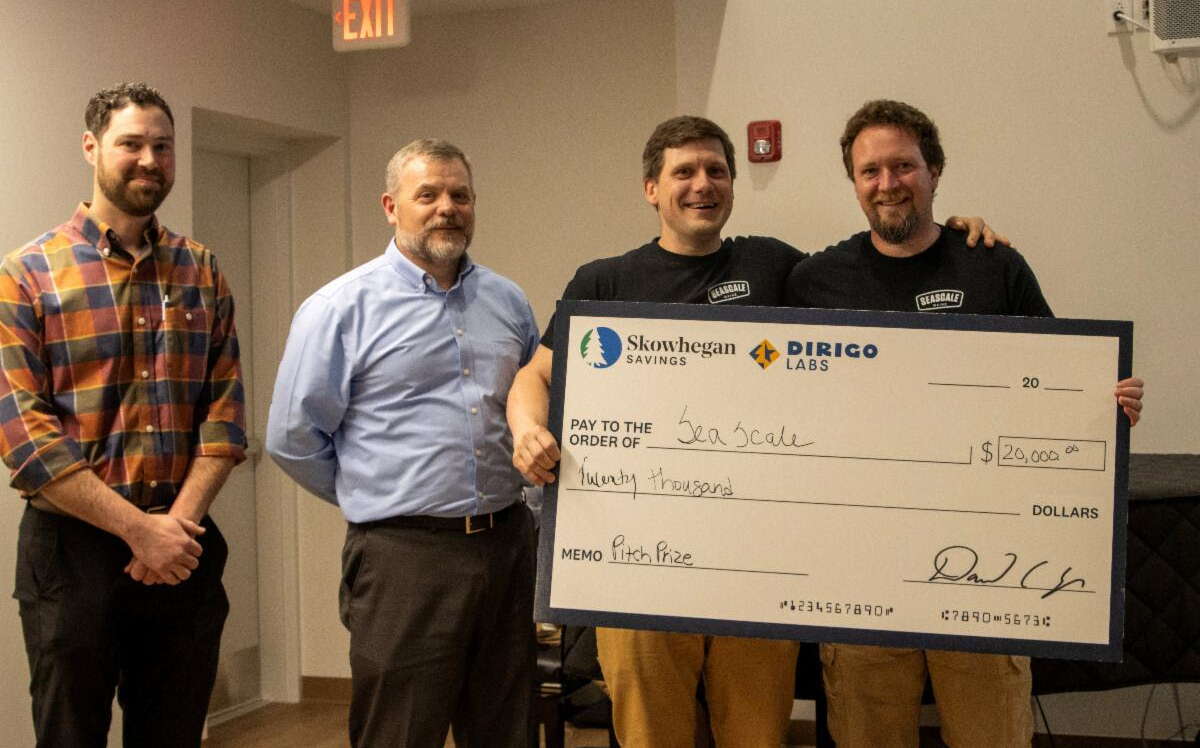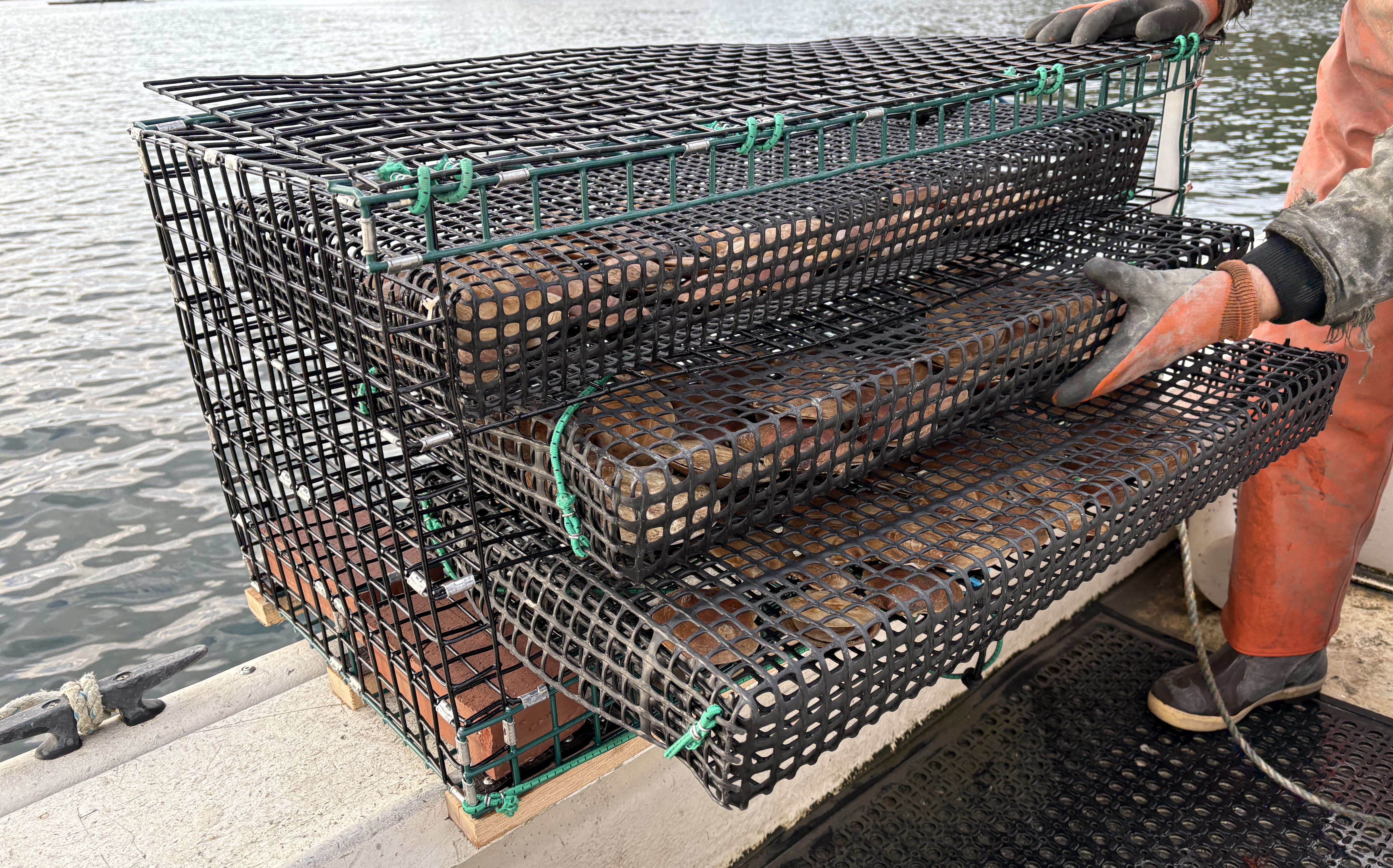
Thomaston maker of scallop-farm gear sweeps all categories in Dirigo Labs pitch contest
 Photo / Courtesy Seascale
Seascale, a Thomaston startup, makes a modular system for growing scallops.
Photo / Courtesy Seascale
Seascale, a Thomaston startup, makes a modular system for growing scallops.
A Thomaston startup that developed a new type of scallop farming grow cage scooped up $25,000 in cash prizes at a pitch competition held by Dirigo Labs in Waterville.
Seascale, founded by Charles Walsh and Jon Steuber, swept the competition’s three prize categories, receiving $20,000 as the judge’s Pitch Prize winner, $3,000 as the Founder’s Choice award and $2,000 by audience voting.
The cash awards were sponsored by Skowhegan Savings Bank.
The company’s core innovation, the Maine Scallop Pot, is a modular aquaculture system designed to integrate into the routines of working fishermen, without disrupting daily lobstering operations.
“These prizes will help us expand operations and empower more coastal communities to build resilience through sustainable aquaculture,” said Walsh.
The Maine Scallop Pot is designed to be used around the daily rhythms of working lobstermen, enabling fishermen to cultivate scallops without adding labor-intensive tasks or disrupting established routines.
“We built the Maine Scallop Pot to make aquaculture a real, viable option for working fishermen, not just in Maine, but anywhere traditional fisheries are facing pressure,” said Steuber.
Startups pitched innovations spanning cleantech, manufacturing, marine technology and software, and were evaluated on capital strategy, team strength, potential for economic or community impact, storytelling and innovation.

Over the course of the 12-week accelerator, startups received mentorship from a national network of subject-matter experts and investors. Curriculum topics included customer acquisition, employment law, sales and public-private funding opportunities, all aimed at helping founders refine their business models and scale their impact.
“This cohort demonstrated not only creativity and resilience but also a strong commitment to solving real-world challenges,” said Susan Ruhlin, Dirigo’s managing director.
Dirigo Labs is a regional startup accelerator in Waterville, operating under the Central Maine Growth Council and supported by organizations, academic institutions and investment firms across Maine and beyond
Scallop pot
The scallop growing gear Seascale developed looks like a lobster trap, hauls and sets like a lobster trap and can be stacked like traps.
But each is fitted with shellfish bags and is purpose built for growing scallops
With the tagline “Aquaculture Integration for Marine Fishermen,” the goal is to provide high-quality, easy-to-integrate aquaculture gear that helps lobstermen add revenue streams without changing the way they fish, according to the company’s website.
Like lobster traps, the pots can be strung in trawls and set in different areas throughout the year to maximize productivity and to avoid conflict with lobster traps and scallop draggers.
Partnership development
Walsh grew up on the Maine coast and started his career cooking professionally and lobstering in the off season, while managing puffin and tern colonies for the U.S. Fish and Wildlife Service in the summers.
He spent the last decade scaling aquaculture production and developing sustainable seafood products for the retail and wholesale market. That included running the University of Maine’s experimental shellfish hatchery, scaling nursery and farm production of organic sugar kelp with Maine Sea Farms, growing oysters for Pemaquid Oyster Co. and building American Unagi’s processing and smokehouse operations.

Steuber has worked as a lobster boat sternman in the Knox County town of St. George since 2019. While commercial fishing, he helped his boat diversify income streams by expanding into kelp production.
He has 15 years of experience in partnership development, program design and implementation, and nonprofit management as the co-founder and former co-CEO of Valpo Surf Project, a youth mentorship and community development organization in Valparaíso, Chile. He continues to drive the organization’s growth as a member of its board of directors in the U.S. and Chile.
Startup
The initial concept for Seascale and the Maine Scallop Pot started in August 2024 and was registered as an LLC with the state of Maine in September 2024, Steuber told Mainebiz.
The base of operations is in Thomaston — in Walsh’s uninsulated, unheated and unelectrified barn, with offices in Walsh’s living room, Steuber’s kitchen and both of their pickup trucks.
So far, each has invested about $2,000 in initial startup capital plus sweat equity working nights and weekends. Walsh and Steuber continue to work other jobs in order to pay the bills. Last fall, both were working at Pemaquid Oyster Co. in Damariscotta. The commutes and workdays “allowed ample time for discussing the design, implementation, and business development for Seascale,” said Steuber.
This spring, the two continued those conversations while working for St. George carpenter and boatbuilder George Emery. Walsh continues to work on carpentry and boat projects while Steuber is working as a sternman for fisherman Gerry Cushman out of Port Clyde.
“We are currently bootstrapping Seascale’s operations through our own funds, generating some income through initial sales and pursuing some early grant funding,” said Steuber.














0 Comments